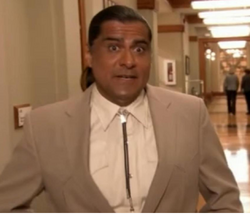The show "Parks and Recreation" is a mocumentary about the parks and recreation government department of a small town in Indiana called Pawnee. The town of Pawnee, according to the show, has a bloody history between the Native Americans that were the original owners of the land, the Womapoke tribe, with the white settlers. In the episode "Harvest Festival," the main character, Lesley Knope, who is a white middle class woman, hosts the annual Pawnee harvest festival on what the Native American Womapoke tribe chief informs her is the site of the massacre of his ancestors. The chief, Ken Hotate, asks her to change the location of the harvest festival but Lesley claims it is too late. In response to her refusal, Ken informs her that he is going to put a curse on the festival, however he later tells the camera that the curse isn't real but that "There are two things I know about white people: they love Matchbox 20, and they are terrified of curses." While he is telling the Parks department to change the location, he messes with the white government workers by playing on the dynamics that often exist between whites and PoC when whites do not want to come off as racist. Later on, the media finds out about the supposed curse and covers it heavily, which scares the Pawnee citizens, proving Ken Hotate right, that the white people of the town are terrified of curses. After Ken and Lesley come to an agreement, Ken agrees to "lift" the curse, but really only says "I am not saying anything. No one can understand me anyway. Doobee. Doobee. Doo" in his native tongue that none of the citizens of Pawnee can understand and believe that he has lifted the curse.
Generally, older Native American men are represented in media as the wise or magical medicine man, who exists solely to further the plot of the white male protagonist by either imparting them advice or using magic on or for them. Ken Hotate knows about these stereotypes and mocks and messes with the white population of Pawnee by pretending to place a curse on them. Ken willingly partakes in this stereotype for personal gain, which in the fictional world that he exists in would act to perpetuate that stereotype. As viewers, though, his actions contest the stereotype by showing that the white citizens of Pawnee are the butt of the joke for believing in curses that are cast by an older Native American man. This character shows us that the Native American community is aware of the misrepresentations of themselves in media, as well as that they are openly critical of them.
Ken Hotate, while not adhering to many of the stereotypes that are typically seen being represented by many other characters in media, does adhere to the stereotype of owning a casino. I am not sure, however, what the real world consequences of that stereotype being presented in media has. Possibly the fact that Ken Hotate owns a casino and is well off financially fails to show the economic subjugation that many Native Americans face during their whole lives. His interactions with the white people did properly show part of the social dynamics that exist between whites and Native American people. It is important to note, however, that I am not Native American and therefor have no say in what is fair representation and what is not.

The representation of an American Indian man being wise or magical medicine man is almost true. Being a full-blood Navajo our tribe does believe in a medicine man, The medicine man is old and he is wise. While talking with other friends from across the U.S. who are of American Indian tribes they to have medicine men that can heal with the Creator's guide. But to put curses on towns and people can be classified under the fiction novel and the media does get a kick out of this. Native people, unless by putting their voice out in mainstream society, do have a stereotype of mysteriousness set on them.
ReplyDelete